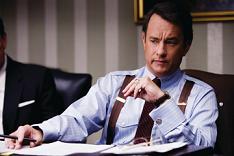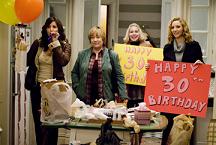 As a die-hard fan of “The West Wing” who mourned its disappearance from network television, I’ve missed American politics as processed through the quirky and brilliant mind of Aaron Sorkin. Lucky for me, “Charlie Wilson’s War” provides another shade from Sorkin’s palette, one which swaps his trademark crackling dialogue for a fast-paced, charm-filled snapshot of historical American politics.
As a die-hard fan of “The West Wing” who mourned its disappearance from network television, I’ve missed American politics as processed through the quirky and brilliant mind of Aaron Sorkin. Lucky for me, “Charlie Wilson’s War” provides another shade from Sorkin’s palette, one which swaps his trademark crackling dialogue for a fast-paced, charm-filled snapshot of historical American politics.
If you haven’t yet witnessed the film’s award-season blitzkrieg, “Charlie Wilson’s War” is the true story of a relatively unknown skirt-chasing, whiskey-guzzling Texas Congressman (Tom Hanks) who organizes and spearheads the events that drive the Soviets out of Afghanistan, thereby bringing about the end of the Cold War. Though the movie’s cheeseball poster looks as if it was created to repel people in droves from theaters, this film is actually a fascinating foray behind closed (political) doors to see what goes into funding a covert war that will liberate a people and save untold hundreds of thousands of Afghan lives.
The fact that this all really happened and was chronicled in the George Crile book of the same name (whose subtitle is the longest I’ve ever seen and simply must share: “The Extraordinary Story of How the Wildest Man in Congress and a Rogue CIA Agent Changed the History of Our Times”) makes this Mike Nichols-directed film all the more inspiring. Charlie Wilson is an honest, if not immature, character who effects phenomenal change in the world. If he can, why can’t we?
Since I’m encouraged to wax spiritual here at Idol Chatter, “Charlie Wilson’s War” does venture into touchy religious issues, first when a crèche can’t be displayed on public property in Wilson’s district and next when a religious Congressman (played by Ned Beatty) who chairs an integral funds appropriations committee needs to be convinced that allocating more money for the war equates with him “being called to do God’s work.”
God is on the side of good, of course, and he apparently wants to rid Afghanistan of the Soviets. Who could argue with him being pro-war to save innocent Afghan lives? But does that also mean that he wants to provide a well-armed safe haven for the Taliban and Osama himself in subsequent years? Or is he bound by the constraints of time like the rest of us, unable to see even a decade into the future?
It’s a difficult theological situation and one that arises whenever God is proclaimed to be on one side of a conflict over another, whether that occurs on a battlefield, a football field or onstage aligning himself with one Grammy nominee above another.
This film actually made me wince every time someone gleefully shouted “Now let’s go kill some Russians!” Charlie Wilson’s Russians are today’s Islamic jihadists and tomorrow’s… Iranians? North Koreans? Canadians? Does that reaction make me a pacifist? More spiritual than religious? Or simply more Eastern than Western in religious thought?
Although I have nothing but praise for Tom Hanks and the eminently-watchable Julia Roberts, the real star of this movie is the story itself. In terms of performance-based awards for this particular film, since that’s all the buzz these days, my only standout vote goes to Philip Seymour Hoffman, who is simply terrific as the complex, blue-collar CIA agent Gust Avrakotos. I would actually see this film again simply for his character’s gruff and hilarious onscreen wisecracks.
— Written by Todd Havens


